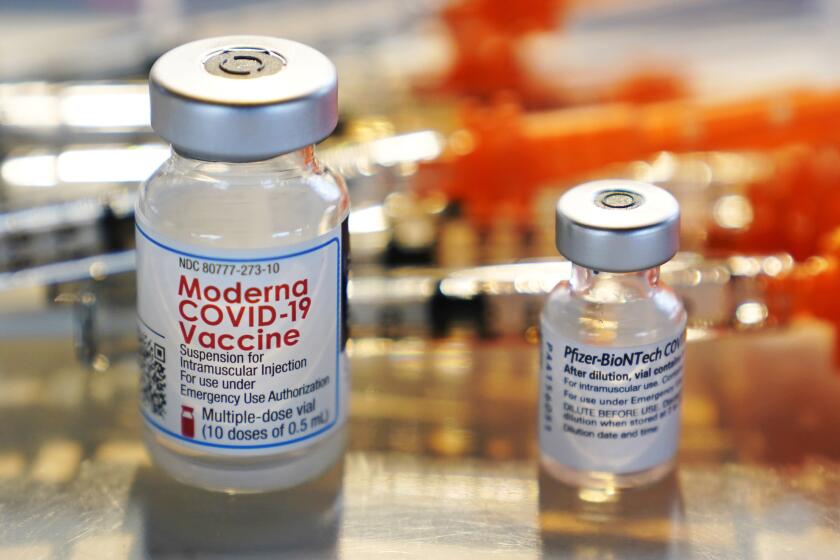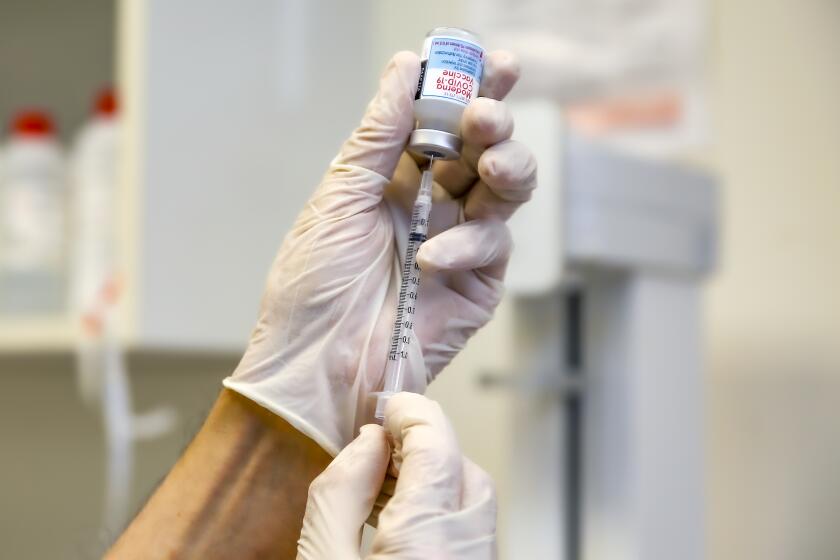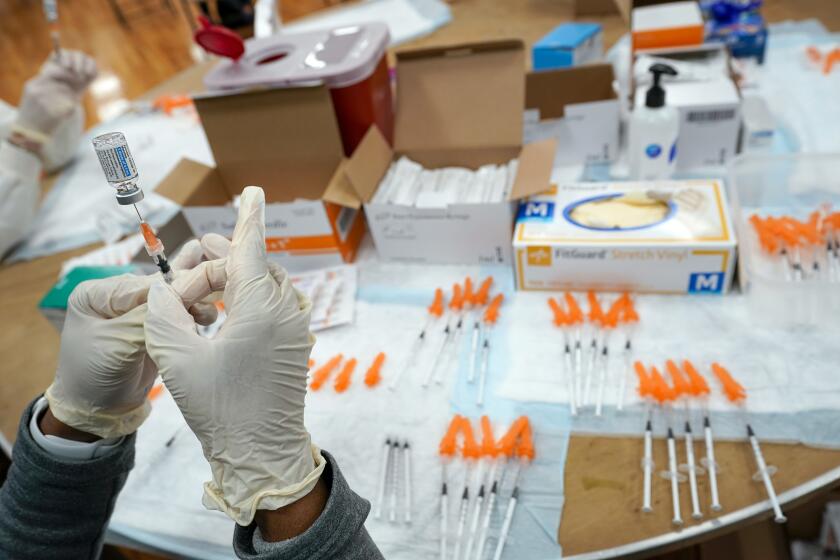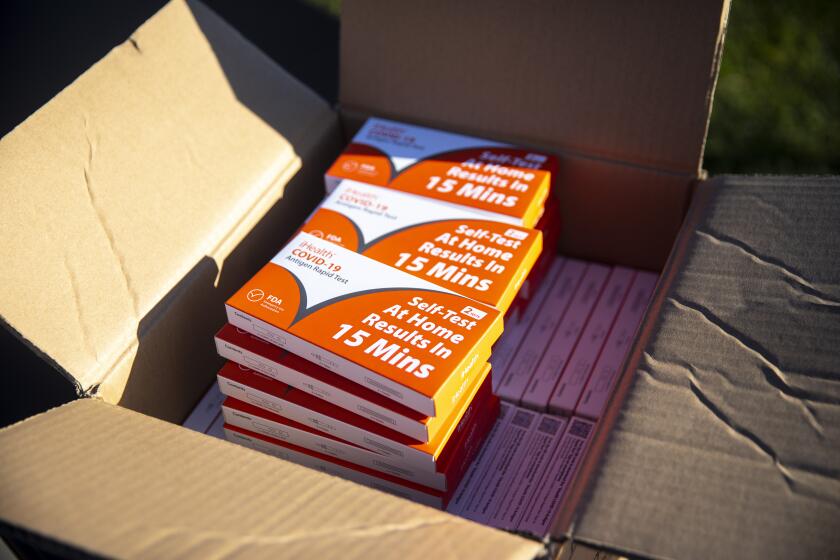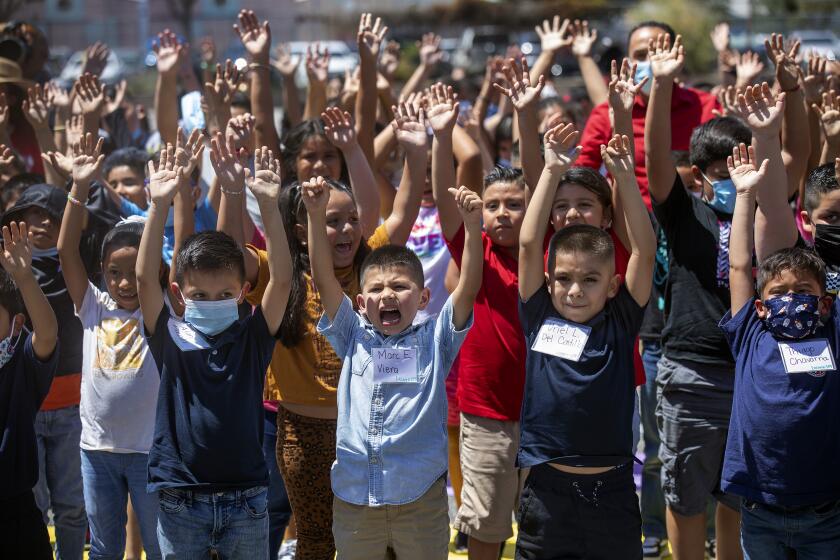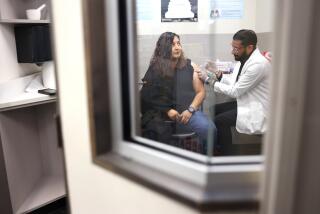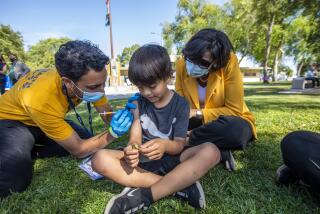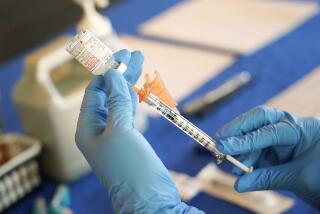Omicron COVID-19 booster shots are coming: Will they be a game-changer?
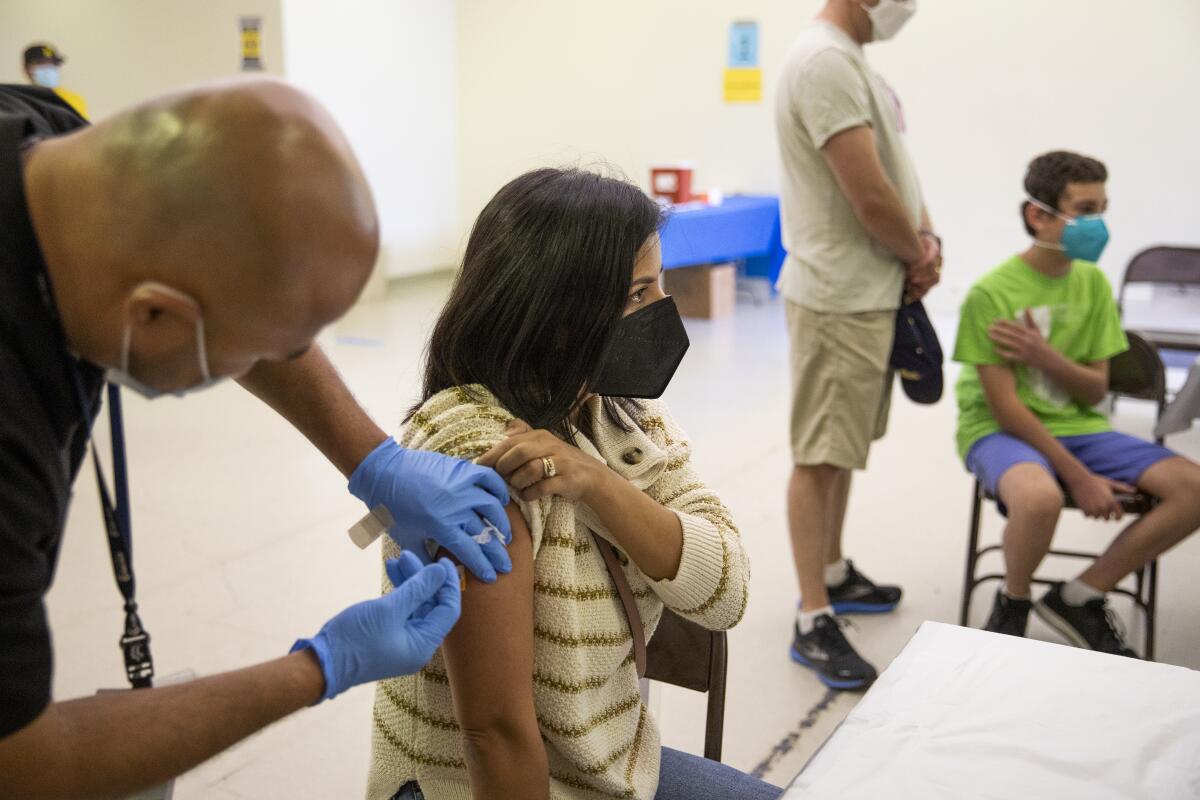
- Share via
The next generation of COVID-19 booster shots — tailored specifically to combat the super-infectious family of Omicron subvariants — could roll out early next month.
The long-in-the-works offering would mark an ambitious new phase in the nation’s vaccination campaign and, officials say, give residents another option to protect themselves ahead of a possible coronavirus resurgence in the fall and winter.
But who will be able to roll up their sleeves this time? And do those who have already received a booster, or two, really need to get another one? Here’s what we know.
With new COVID-19 boosters expected later this year, health experts urge Californians not to put off a first or second booster shot until then.
When will the Omicron booster shot be available?
The new booster could be available sometime in September, White House COVID-19 response coordinator Dr. Ashish Jha said at a recent forum. But the shots will first need to be OK’d by the U.S. Food and Drug Administration and the Centers for Disease Control and Prevention.
In a signal that the agencies may be close to an unveiling, the CDC’s Advisory Committee on Immunization Practices has scheduled a meeting Sept. 1-2. The committee typically meets to offer recommendations to the CDC director, Dr. Rochelle Walensky, before she offers recommendations on who should get the vaccine.
“We haven’t seen anything official just yet, but we are planning for whenever it comes out to get it to all of our vaccination providers,” Dr. Muntu Davis, Los Angeles County’s health officer, said Thursday of the new boosters’ timing.
Who would be eligible to get the shots?
While the final call is still pending, the expectation is that eligibility will be broad.
Pfizer on Monday asked the FDA to authorize its new Omicron booster shot for people age 12 and older. Moderna made the same request Tuesday for adults for its booster.
The new booster ‘will become available by early to mid-September,’ if the FDA and CDC authorize shots, a top White House official said this week.
What’s the benefit of getting the new booster?
The latest dominant Omicron subvariant, BA.5, differs in a number of ways from the original strain the vaccines were designed against, Jha said.
While the original vaccines still do relatively well in keeping people out of the intensive care unit and dying, he said, their effectiveness in preventing infection has declined over time because of the evolution of the Omicron strain.
BA.5, in particular, has proved to be not only highly transmissible but also able to reinfect those who recently got over a bout with a prior strain of the coronavirus.
The Omicron booster, Jha added, represents a potentially substantial upgrade in the vaccine “in terms of their ability to prevent infection, to prevent transmission, certainly to prevent serious illness and death.”
Dr. Peter Chin-Hong, a UC San Francisco infectious disease expert, said the Omicron booster will help prevent people’s lives from being disrupted by an infection.
As of mid-July, unvaccinated Californians were seven times more likely to get COVID-19, nearly 12 times more likely to be hospitalized with the disease and 11 times more likely to die than their vaccinated-and-boosted counterparts, according to the latest data from the state Department of Public Health.
U.S. regulators are telling COVID-19 vaccine makers to tweak any booster doses intended for fall so they protect against the newest versions of Omicron.
When should people get the new booster?
Generally, many officials and experts recommend getting a booster as soon as you’re eligible — particularly if you’re at higher risk of severe health consequences from COVID-19.
But others may decide to wait a bit, until October or November, as the booster’s potency will likely wane over time, as has been the case with other vaccine doses.
Peak effectiveness will likely be in the four or five months following the shot, with the maximum effectiveness one month after the injection, according to Chin-Hong.
In the pandemic’s first fall-and-winter wave, coronavirus cases in California began increasing in November and accelerated sharply in December. In last year’s fall-and-winter wave, cases began spiking in December.
Federal officials have said that people who got a conventional booster shot earlier this year — including a second booster — will be eligible for the Omicron booster.
Should I get a conventional booster now or wait for the Omicron one?
Since Omicron boosters could be mere weeks away, it depends.
Existing CDC guidance recommends most adults and children age 5 and older get a booster at least five months after completing their primary vaccination series. (Immunocompromised people should get their booster at least three months after the primary vaccination series.)
Adults 50 and up and immunocompromised people are recommended to get a second booster at least four months after their first booster.
People older than 65 who are past due for a booster should get the conventional shot now, according to Chin-Hong.
Getting a conventional booster now would also make sense for people who are, for instance, five or more months out from their last COVID-19 inoculation, are eligible for a booster and are about to go into a higher-risk situation, such as taking a trip abroad, he added.
“If you’re going to wander into places with a lot of exposure — like you’re going to Europe — you might want to consider getting the fourth shot sooner [rather] than later,” UC San Francisco epidemiologist Dr. George Rutherford said at a recent campus town hall. But getting a conventional booster now may mean you’ll have to wait before becoming eligible for the Omicron booster, he said.
Other people already overdue for a booster can reasonably decide to wait for the Omicron shot, he said.
Federal regulators have extended some coronavirus tests’ expiration dates, meaning that certain offerings are now usable for months longer.
What about children younger than 12?
Neither Pfizer nor Moderna has sought clearance to offer Omicron boosters to children younger than 12. That age group already lags well behind others in terms of vaccination rates.
Doctors recommend getting younger children vaccinated, even if it’s with the conventional vaccine, given its effectiveness in protecting against hospitalization.
Vaccinations are important, Chin-Hong said, because “you can’t really always predict who’s going to go to the hospital [from COVID-19] in the under-12 age group, and you don’t know what variant is coming. So I think that it behooves everybody to think seriously” about vaccinating children.
“We’ve been getting more and more data that it is effective for the most serious outcomes,” he said.
Chin-Hong cited a recent study of the Pfizer-BioNTech vaccine for children 5 to 11 during the first Omicron surge in Singapore, which found that completing the primary vaccination series was 83% effective against hospitalization.
“We have not seen serious side effects in kids ages 5-11” as a result of getting vaccinated, Dr. Rhea Boyd wrote on an American Academy of Pediatrics website. “It is safe and it works.”
Health experts are watching to see how schools do without expansive masking and testing for COVID-19, especially with many children unvaccinated.
Vaccinations also can reduce the chances of long-term side effects after experiencing COVID-19, including long COVID. In addition, a COVID-19 diagnosis is associated with a subsequent higher chance of getting diabetes for both adults and children.
U.S. children between 5 and 11 became eligible for COVID-19 vaccinations last November and for a booster in May.
Children younger than 5 became eligible for COVID-19 vaccines in June. Pfizer on Tuesday said its vaccine was 73% effective at preventing COVID-19 among children 6 months to 4 years old. Before the shots became available, pediatricians said that the Omicron variant pushed hospitalization rates for children age 4 and younger to the highest level of the entire pandemic.
More to Read
Sign up for Essential California
The most important California stories and recommendations in your inbox every morning.
You may occasionally receive promotional content from the Los Angeles Times.
